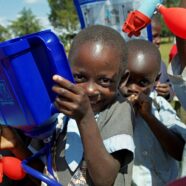
Carbon for Water delivers safe water to 4.5m people in Western Kenya, improving the health and well-being of 900,000 families, slowing deforestation and cutting a substantial 2.4m tonnes of CO2 emissions each year. Katharine Earley explores how the project works, highlighting the innovative financing model and business-like rigour that have ensured its success, and considers how investing in this and other similar projects can help organisations to address multiple corporate responsibility goals.
The idea that businesses hold the key to catalysing progress on sustainable development – at the scale at which it’s needed – is rapidly gathering momentum. Official sources of funding alone are not sufficient to tackle today’s food, health, water, energy and climate challenges. ‘Closing this gap requires innovative thinking,’ the UN’s 2011 Human Development report suggests.
Carbon for Water is a ground-breaking sustainable development project: it brings a stable source of private sector finance to a world-first programme, delivering safe water to developing communities in Kenya on an unprecedented scale. It has recently been named as one of the UNFCCC’s ‘Momentum for Change’ lighthouse projects, and has won multiple health and sustainability awards.
As the Carbon for Water film articulately explains, this isn’t charity, this is ‘smart business’. Every aspect of the project is results-driven, with each of the companies involved incentivised to ensure that the progress made is real, tracked and reported, which in turn generates a future flow of carbon credits to sustain the programme.
The challenge of obtaining safe water in rural Kenya
90% of people in Kenya’s Western Province lack access to safe water, with waterborne disease a major cause of poor health. Diarrhoea is the third most prominent cause of death among children and adults in Kenya, according to the World Health Organisation. Meanwhile, the UN’s Millenium Development Goals call for the number of people without access to safe drinking water and basic sanitation to be halved by 2015.
Rural Kenyan communities typically use firewood from the country’s scant remaining woodland to boil river water and remove impurities. Women and children often spend long hours collecting wood or spending their families’ limited income to buy it. The water is then boiled over smoky fires in the home, which dramatically affects indoor air quality and can lead to serious respiratory illnesses.
How does the project work?
Nearly 900,000 LifeStraw household water filters were distributed by international project developer Vestergaard Frandsen in early 2011 to communities throughout Kenya’s Western Province. The filters were provided as part of an integrated health programme, with around 8,000 Kenyans employed as health workers and drivers for the duration of the campaign. Every household using a filter is regularly monitored to ensure the filter is used correctly, with the frequency of use and volume of water filtered independently logged and verified.
The project follows a Gold Standard methodology, lead-authored by climate and development specialist ClimateCare, which, importantly, also outlines precisely how the carbon emisson reductions generated via the project should be calculated. The resulting carbon credits can then be issued and bought by businesses, governments and individuals worldwide.
What benefits does the project deliver?
By using a simple water filter to purify unsafe water in the home, families in rural Western Kenya are benefitting by experiencing an improved quality of life. Women and children spend less time and money seeking firewood, while families spend fewer hours exposed to smoky fires in the home, improving maternal health and helping to prevent child mortality. The incidence of waterborne disease is also lowered, and families benefit from education on key health issues. At the same time, deforestation is slowed as less wood is burnt in the home, and significant carbon emission reductions are achieved.
Corporate responsibility
Supporting Carbon for Water or one of ClimateCare’s many climate and development projects provides an opportunity for corporate organisations to adopt an integrated approach to corporate responsibility, the company says, making smarter use of existing budgets by supporting initiatives that fulfil multiple sustainability objectives. For example, its clean cookstoves initiatives have delivered more energy efficient cookstoves to more than 750,000 people in Cambodia, Ghana and Uganda. This is helping to protect local forests, stimulate local economies and tackle pneumonia, one of the developing world’s biggest killers.
In addition to reducing carbon emissions and generating positive environmental, socio-economic and health outcomes, ClimateCare is realistic about the need for initiatives to be profitable for the company, its partners, clients and investors. The company has saved more than 12.5m tonnes of CO2 equivalent since its inception in 1997, and aims to ensure that funding action on critical sustainable development issues is an intelligent and profitable decision.
This article was published on the 2degrees network site.

